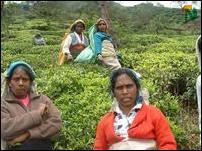
Estate youths seek greener pastures
[TamilNet, Monday, 30 August 2004, 05:15 GMT]
Growing population of young adults within the community of plantation workers in hill country towns of Nuwara Eliya, Hatton, Bandarawela and others see education as their best opportunity to break out of the miserable living conditions their parents endure. More are seeking lower-middle class employment in and out of their estates. "Out of the thirty staff running this show room, fifteen are children of plantation workers," said Malar Rani who attends to the stream of visitors inspecting the merchandize displayed at the Laboakellie tea estate, located 15 km north of Nuwara Eliya town.
"Our parents had to live in atrocious conditions despite contributing substantially to Sri Lanka's economy. The new generation will not be tied to the same trade. Although access to good schools are limited, the estate schools can still provide us a path to a better life," added another female employee.
Estate Management is concerned with the changing attitudes within the plantation youths which is likely to lead to a dwindling pool of workers prepared to pluck tea leaves.
In the same estate, Rani's mother earns Rs.147 per day picking tea leaves. "On the average she earns Rs.2500 a month. Only during the peak season she is allowed to work all 30 days to earn close to Rs.4500. Even then, our families would have normally accumulated debt of some sort, and there is scarcely any money left to lead a decent living or to save," Rani spoke of the predicament of her parents.
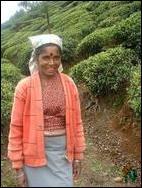 |
| Kangani at the Bamboragola tea estate
|
Line rooms, the extremely squalid quarters Tamil estate labourers live, have been a subject of many documentaries but little has changed in recent years to improve the living conditions of the plantation workers.
Ms.Thanapathy, a tea picker at the Bamboragola estate, 10 km north of Nuwara Eliya, said she is paid Rs.101 a day for a minimum weight of 15 kilos. "Health facilities given to us are barely adequate. Our hill country politicians do not take active interest in improving our living conditions," she said.
The trade unions, comprising the Ceylon Workers' Congress (CWC), Lanka Jathika Estate Workers Union (LJEWU) and Joint Plantation Trade Union Committee (JPUTC) negotiate with the Employers Federation of Ceylon (EFC) on wage agreements.
However, estate management has little incentive to comply with these wage agreements.
Plantation workers checkered history goes back to 180 years. Their struggle towards obtaining full citizenship ended in October 2003 when a bill to grant citizenship to 168,141 stateless Tamils in Sri Lanka descended from people who settled in the hill districts of the island in the 19th century was passed without opposition in Sri Lanka’s Parliament.
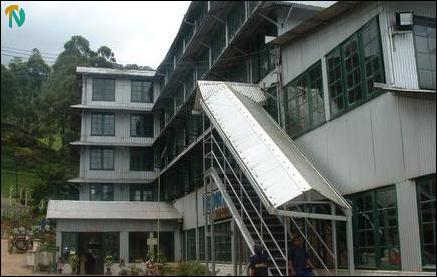 Tea factory in Laboakellie estate
Tea factory in Laboakellie estate
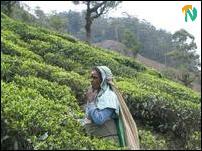 |
| Plantation worker on her way to pick at least 15kilo to ensure her daily wage
|
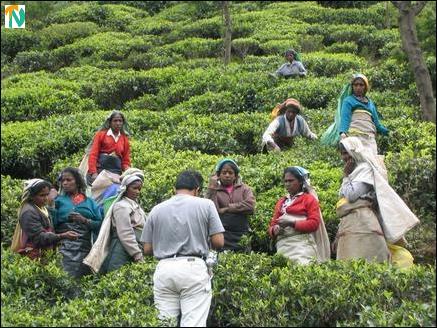 Workers in Bamboragola estate take some time off to talk
Workers in Bamboragola estate take some time off to talkTime line of citizenship struggle of plantation workers:
- 1823: South Indian Tamil laborers recruited from districts of Chenkelpettai, Coimbatore, Madurai, Thanjavoor, Thiruchirapalli and others arrive to work in plantations.
- 1920: Mr.Natesa Iyer becomes first Indian representative to legislative council.
- 1924: Two Indians nominated to legislative council. Franchise was limited to elite. Indian Tamils represented 12900 out of 205,000 electoral college votes.
- 1931: Universal adult franchise was introduced in Sri Lanka under the Donoughmore constitution plantation workers were granted franchise.
- 1931-36: Registered voters of Indian origin rose from 100,000 to 145,000.
- 1939: Resolution introduced in the State Council to deport 15000 Indians. A second resolution moved by D. S Senanayake (independent Ceylon’s first Prime Minister) to deport all Indians appointed to government service after 1934 and to discontinue the service of all those with less than ten years experience.
- 1939: Arrival of Jawaharlal Nehru on the advice of Mahatma Gandhi to unite all the groups. Emergence of the Ceylon Indian Congress.
- 1947: Elections bring political strength to the Indian Tamil community with the election of seven out of the 95 member Parliament. This was equal to the seven Tamil members elected from the North East.
- 1948: The Ceylon Citizenship Act, though providing the qualifications to be a citizen, was designed to disqualify persons of Indian origin. The provision said that “only a person born in Ceylon prior to the date of the Act coming into force, of a father born in Ceylon could be recognised as a citizen”. This decitizenized all persons of Indian origin since proof of birth of two generations was necessary.
- 1949: Enactment of Indian and Pakistani (Residents) Citizenship Bill. It laid down qualifications for citizenship as registered citizens (sic). The qualifications inherent in the bill were designed to deny citizenship.
- 1951: 237,034 applications requesting citizenship for 825,000 (90%) persons of Indian origin were made. Majority of applications were rejected as many were unable to produce evidence of birth in Sri Lanka, to provide proof of uninterrupted residency or to provide proof of an assured income.
- 1956: Elections too proved negative to the Indian origin people since they had no strength to field candidates.
- 1960: The government of Mrs. Bandaranaike created a nominated representation for the people of Indian origin and appointed Savumiamoorthy Thondaman to Parliament.
- 1964: Mrs. Bandaranaike moved to solve the citizenship problem in keeping with the Sinhala thinking that persons of Indian origin should return to India. India, then led by Lal Bahadur Shastri agreed to this move by agreeing to accept 525, 000 back to India. Sri Lanka had agreed to grant citizenship to 300,000 persons leaving the future of 150,000 people to be settled later.
- 1974: A further bartering was done under the Sirima (Sic) Indira Gandhi agreement, dividing the balance people between the two countries.
- 1965: The UNP government too nominated Savumiamoorthy Thondaman to Parliament in return for his support to defeat the government of Mrs. Bandaranaike.
- 1977: Savumiamoorthy Thondaman contested the Nuwara Eliya – Maskeliya multi member seat and was elected to Parliament as the third member. After thirty years since 1947 a member was elected to parliament by the people of Indian origin.
- 1978 to 1988: Thondaman made several representations for the expeditious grant of citizenship under the two Indo Ceylon Agreements. He also urged that persons who were left out of the two agreements be granted Sri Lankan citizenship. Only 506, 000 persons applied for Indian citizenship out of the 600,000 envisaged under the agreements.
- 1988: Grant of Citizenship to Stateless Persons (Special Provisions) Act No. 39 of 1988 was presented to Parliament by Premadasa and passed. This was opposed by the SLFP who voted against it. The people of Indian origin who were until then deprived of the rights flowing from citizenship were overwhelmed by their achieving their long dreamed goal.
- 2003: A bill to grant citizenship to 168,141 stateless Tamils in Sri Lanka descended from people who settled in the hill districts of the island in the 19th century was passed Tuesday without opposition in Sri Lanka’s Parliament. All 172 MPs who were present in the 225 seat Parliament voted for the bill to amend the citizenship act.
Related Articles:
03.12.03 Stateless Tamils register for citizenship in Sri Lanka
07.10.03 Stateless Tamils’ long struggle bears fruit
18.05.03 Election alliances harmful to upcountry leadership - UPF
10.03.01 Tamil parties join hill country protest
20.12.99 Estate workers strike
10.04.99 Tea estate workers strike
14.09.98 Ethnic cleansing in the estates
05.02.98 Plantation workers strike over wages
20.01.98 Wage crisis brewing in tea industry
30.10.97 Sterilisation being used to reduce Tamil population










